 Libri di TALEB NASSIM NICHOLAS su Unilibro.it) Libri di TALEB NASSIM NICHOLAS su Unilibro.it)
|
|
2024 |
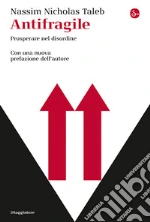 Title :
Antifragile. Prosperare nel disordine
Title :
Antifragile. Prosperare nel disordineAuthor: Taleb Nassim Nicholas Publisher: Il Saggiatore Con Antifragile Nassim Nicholas Taleb ci offre una prospettiva rivoluzionaria sull'individuo e la società. Un'opera ormai considerata un classico contemporaneo al pari del Cigno nero, che, attraversando medicina e alimentazione, architettura e tecnologia, informazione ed economia, ci mostra come, per raggiungere un maggior benessere personale e collettivo, non sia necessario fare sempre di più: meno è meglio. La chiave di tutto è l'«antifragilità». Sappiamo che la nostra incapacità di capire a fondo i fenomeni umani e naturali ci espone al rischio di eventi inaspettati. Ma l'incertezza non è solo una fonte di pericoli da cui difendersi: possiamo trarre vantaggio dalla volatilità e dal disordine, persino dagli errori, e diventare antifragili. Infatti, a differenza del «fragile» - ciò che si lascia danneggiare dagli eventi esterni - e del «robusto» - ciò che sopporta i colpi e rimane uguale a se stesso -, l'antifragile «desidera» gli shock e se ne nutre per crescere e migliorare. Nell'ottica dell'antifragilità, perciò, Taleb ci mostra come le città-stato funzionino meglio degli stati-nazione, la spontanea confusione dei suk sia preferibile all'eleganza formale dei mercati regolati e il naufragio del Titanic abbia salvato molte più persone di quante ne abbia fatte annegare; ma anche come le grandi corporation siano una minaccia per la società e i piccoli imprenditori ne rappresentino la forza. Quella di Taleb è una guida audace e radicale per aiutarci a vivere con semplicità e naturalezza in un mondo che non sempre comprendiamo appieno, dandoci il coraggio di guardare in facci € 28,00
Scontato: € 26,60
|
|
|
2023 |
 Title :
Il cigno nero. Come l'improbabile governa la nostra vita
Title :
Il cigno nero. Come l'improbabile governa la nostra vitaAuthor: Taleb Nassim Nicholas Publisher: Il Saggiatore Prima della scoperta dell'Australia gli abitanti del Vecchio Mondo erano convinti che tutti i cigni fossero bianchi: una convinzione inconfutabile, poiché sembrava pienamente confermata dall'evidenza empirica. L'avvistamento del primo cigno nero è stato quindi una sorpresa; ma non è questo il punto. Il punto è che una conoscenza basata sull'esperienza pregressa è una conoscenza fallace, che ci rende fragili al cospetto dell'infinità di eventi che possono verificarsi. Basta un solo cigno nero per sbriciolare un'asserzione generale ricavata da millenni di avvistamenti di milioni di cigni bianchi. E allora perché ci ostiniamo a basare le nostre vite sulla previsione del futuro e sul controllo dei rischi? Perché continuiamo ad affidarci alle scelte basate sul già noto, come se non sapessimo che l'ignoto esiste e possiamo incontrarlo? Guerre, pandemie, crolli finanziari mondiali: com'è possibile che eventi simili riescano sempre a coglierci impreparati? In "Il cigno nero" - ormai un classico della contemporaneità - Nassim Nicholas Taleb ci invita ad abbracciare l'improbabile e accettare, infine, che esso governi le nostre vite. Che sia per pianificare la struttura economica di un paese o i prossimi quindici anni della nostra esistenza questo è il libro da cui farci guidare. € 22,00
Scontato: € 20,90
|
|
|
2020 |
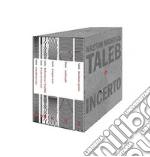 Title :
Incerto
Title :
IncertoAuthor: Taleb Nassim Nicholas Publisher: Il Saggiatore Il cigno nero, Antifragile, Il letto di procuste, Giocati dal caso, Rischiare grosso, Robustezza e fragilità. Libri che hanno influenzato la filosofia, l'economia, la finanza, la statistica e insomma la vita di milioni di persone nel mondo ora raccolti in un unico volume: Incerto . € 65,00
Scontato: € 61,75
|
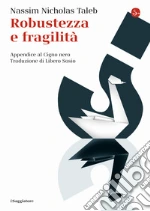 Title :
Robustezza e fragilità. Che fare? Il Cigno nero tre anni dopo
Title :
Robustezza e fragilità. Che fare? Il Cigno nero tre anni dopoAuthor: Taleb Nassim Nicholas Publisher: Il Saggiatore Dopo la pubblicazione, "Il Cigno nero" è stato acclamato in tutto il mondo come un testo rivoluzionario, letto da milioni di lettori, la cui influenza è riverberata nei campi più diversi, dalla filosofia alla statistica, dalla sociologia alla psicologia, dalla medicina agli studi sul clima. In questo seguito del suo saggio "Il Cigno nero", Nassim Nicholas Taleb rileva con ironia come sia stato il mondo economico a rivelarsi il più cieco e refrattario ai Cigni neri, pur essendo l'ambito che maggiormente avrebbe potuto beneficiarne; risponde alle critiche mosse alle sue idee; ripercorre gli incontri con i filosofi, scrittori, scienziati, politici, lettori comuni con cui si è confrontato e ha discusso, vedendo la sua teoria prendere piede e svilupparsi. Robustezza e fragilità esamina le ramificazioni, le conseguenze e le potenzialità della teoria del Cigno nero chiedendosi quale sia la ricetta per avere società più robuste e meno vulnerabili a eventi rari e di grande impatto. Se si osserva la natura, le strutture e gli organismi che prosperano sono quelli che presentano la maggiore ridondanza e variabilità nelle funzioni: per esempio, magari il libro che avete in mano lo si può usare in altri modi, oltre che leggerlo. La fragilità invece risiede spesso nell'eccessiva specializzazione, nonché nella nostra eccessiva - ed errata - certezza di poter prevedere in anticipo l'inaspettato. In "Robustezza e fragilità", Taleb si muove tra esperienze personali, aneddoti curiosi e riflessioni profonde, tracciando le origini e il futuro delle sue intuizioni e diffidandoci dal credere cieca € 14,00
Scontato: € 13,30
|
|
1919 |
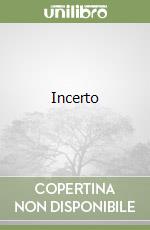 Title :
Incerto
Title :
IncertoAuthor: Taleb Nassim Nicholas Publisher: Random House Inc € 223,10
|
 Title :
Skin in the Game
Title :
Skin in the GameAuthor: Nassim Nicholas Taleb Publisher: PENGUIN GROUP € 15,50
|
|
1918 |
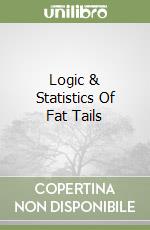 Title :
Logic & Statistics Of Fat Tails
Title :
Logic & Statistics Of Fat TailsAuthor: Nassim Nicholas Taleb Publisher: PENGUIN GROUP € 17,60
|
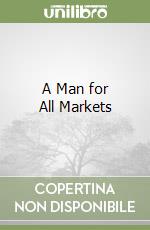 Title :
A Man for All Markets
Title :
A Man for All MarketsAuthor: Thorp Edward O., Taleb Nassim Nicholas (FRW) Publisher: Random House Inc € 16,60
|
 Title :
Skin in the Game
Title :
Skin in the GameAuthor: Taleb Nassim Nicholas Publisher: Random House Inc € 26,80
|
 Title :
Skin In The Game
Title :
Skin In The GameAuthor: TALEB NASSIM NICHOLAS Publisher: Random USA SKIN IN THE GAME - TALEB NASSIM NICHOLAS - Random USA € 20,50
|
 Title :
Skin in the Game
Title :
Skin in the GameAuthor: Nassim Nicholas Taleb Publisher: ALLEN LANE € 25,00
|
|
|
2018 |
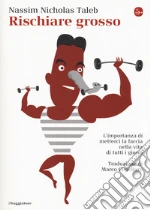 Title :
Rischiare grosso. L'importanza di metterci la faccia nella vita di tutti i giorni
Title :
Rischiare grosso. L'importanza di metterci la faccia nella vita di tutti i giorniAuthor: Taleb Nassim Nicholas Publisher: Il Saggiatore I Cigni neri si sono moltiplicati e hanno oscurato il cielo. L'uccello simbolo dell'«evento imprevedibile di grande impatto» teorizzato da Nassim Nicholas Taleb negli anni è stato usato per legittimare i buchi di bilancio lasciati da banchieri premiati con buonuscite milionarie, giustificare i mercati di schiavi nati dalle ceneri degli interventi militari occidentali o autoassolversi di fronte a votazioni dagli esiti clamorosi come il referendum sulla Brexit. Ma davvero tutto questo era - è - inevitabile? E se invece si trattasse solo di una diffusa mancata assunzione di responsabilità? Se l'antidoto al Cigno nero fosse correre sul serio dei rischi? «Non conta ciò che si possiede ma ciò che si rischia di perdere.» Che si tratti di decidere se cambiare lavoro, lasciare il vecchio fidanzato o concorrere per diventare il prossimo presidente degli Stati Uniti, spiega Taleb, avvicinarsi alla fiamma (e rischiare di scottarsi) è sempre più fruttuoso che rimanere immobili (e congelare). E anche più etico. Ogni rischio è infatti una scelta di fronte a un burrone: l'unico modo per andare avanti è saltare, ma se si fallisce non ci sarà nessun altro a pagarne le conseguenze. Con Rischiare grosso Taleb torna a interrogarsi sulle dinamiche della società contemporanea e offre nuove soluzioni radicali ai problemi della vita di tutti i giorni così come alle storture di politica, economia e informazione. Con il suo consueto stile provocatorio, che unisce l'ironia ad argomentazioni sempre pragmatiche e dirette, e attraversando la storia con riletture iconoclaste e innovative - dal codice di H € 24,00
Scontato: € 22,80
|
|
|
1917 |
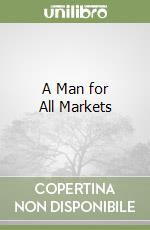 Title :
A Man for All Markets
Title :
A Man for All MarketsAuthor: Thorp Edward O., Taleb Nassim Nicholas (FRW) Publisher: Random House Inc € 27,70
|
|
|
1916 |
 Title :
Incerto
Title :
IncertoAuthor: Taleb Nassim Nicholas Publisher: Random House Inc € 62,50
|
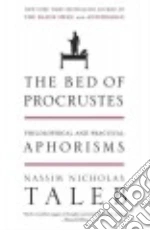 Title :
The Bed of Procrustes
Title :
The Bed of ProcrustesAuthor: Taleb Nassim Nicholas Publisher: Random House Inc € 14,30
|
|
1915 |
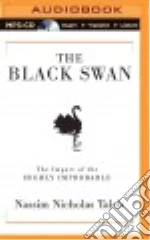 Title :
The Black Swan (CD Audiobook)
Title :
The Black Swan (CD Audiobook)Author: Taleb Nassim Nicholas, Chandler David (NRT) Publisher: Brilliance Audio Maverick thinker Nassim Nicholas Taleb had an illustrious career on Wall Street before turning his focus to his black swan theory. With its revolutionary examination of the impact of highly improbable events, thisNew York Times bestseller took the world by storm. Not all swans are white, and not all events—no matter what the experts think—are predictable. Every so often, one of these unpredictable events occurs and has an immeasurable impact on the world—such as 9/11. Taleb argues the problem is that humans focus too much thought on what they already know, and not enough on what they don’t. The trick is understanding how to deal with black swans when they appear, and how to benefit from them. Witty and irreverant, The Black Swan holds the power to change—for the better—the way people think about the world. It is unlike any book ever written, and its groundbreaking arguments are lucidly articulated by narrator David Chandler. € 15,20
|
|
|
1914 |
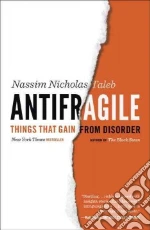 Title :
Antifragile
Title :
AntifragileAuthor: Taleb Nassim Nicholas Publisher: Random House Inc Nassim Nicholas Taleb, the bestselling author of The Black Swan and one of the foremost thinkers of our time, reveals how to thrive in an uncertain world. Just as human bones get stronger when subjected to stress and tension, and rumors or riots intensify when someone tries to repress them, many things in life benefit from stress, disorder, volatility, and turmoil. What Taleb has identified and calls “antifragile” is that category of things that not only gain from chaos but need it in order to survive and flourish. In The Black Swan, Taleb showed us that highly improbable and unpredictable events underlie almost everything about our world. In Antifragile, Taleb stands uncertainty on its head, making it desirable, even necessary, and proposes that things be built in an antifragile manner. The antifragile is beyond the resilient or robust. The resilient resists shocks and stays the same; the antifragile gets better and better. Furthermore, the antifragile is immune to prediction errors and protected from adverse events. Why is the city-state better than the nation-state, why is debt bad for you, and why is what we call “efficient” not efficient at all? Why do government responses and social policies protect the strong and hurt the weak? Why should you write your resignation letter before even starting on the job? How did the sinking of the Titanic save lives? The book spans innovation by trial and error, life decisions, politics, urban planning, war, personal finance, economic systems, and medicine. And throughout, in addition to the street wisdom of Fat Tony of Brooklyn, the voices and recipes of ancient wisdom, from Roman, Greek, Semitic, and medieval sources, are loud and clear. Antifragile is a blueprint for living in a Black Swan world. Erudite, witty, and iconoclastic, Taleb’s message is revolutionary: The antifragile, and only the antifragile, will make it. Praise for Antifragile “Ambitious and thought-provoking . . . highly entertaining.”—The Economist “A bold book explaining how and why we should embrace uncertainty, randomness, and error . . . It may just change our lives.”—Newsweek “Revelatory . . . [Taleb] pulls the reader along with the logic of a Socrates.”—Chicago Tribune “Startling . . . richly crammed with insights, stories, fine phrases and intriguing asides . . . I will have to read it again. And again.”—Matt Ridley, The Wall Street Journal “Trenchant and persuasive . . . Taleb’s insatiable polymathic curiosity knows no bounds. . . . You finish the book feeling braver and uplifted.”—New Statesman “Antifragility isn’t just sound economic and political doctrine. It’s also the key to a good life.”—Fortune “At once thought-provoking and brilliant.”—Los Angeles Times From the Hardcover edition. € 18,50
|
|
|
2014 |
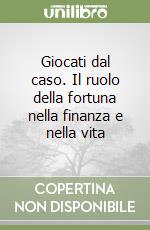 Title :
Giocati dal caso. Il ruolo della fortuna nella finanza e nella vita
Title :
Giocati dal caso. Il ruolo della fortuna nella finanza e nella vitaAuthor: Taleb Nassim Nicholas Publisher: Il Saggiatore Con piglio narrativo e una serie continua di racconti e aneddoti Taleb ci spiega il ruolo che il caso e la fortuna hanno sulla nostra vita. Troppo spesso scambiamo per abilità e bravura quello che è solo fortuna. Utilizzando in modo divertente e accessibile la teoria della probabilità l'autore, che compare nel libro sotto l'aspetto del personaggio Nerone, un moderno Candide, spazia dal famoso processo al giocatore americano OJ Simpson alla filosofia di Karl Popper per dimostrare come l'ignoranza delle regole probabilistiche influenza ogni aspetto della nostra vita. Scambiare la fortuna per abilità può provocare danni enormi mentre saper riconoscere la casualità può rappresentare una fortuna per tutti. € 12,00
Scontato: € 11,40
|
|
|
1913 |
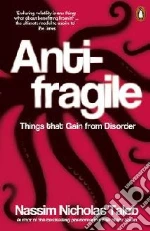 Title :
Antifragile
Title :
AntifragileAuthor: Nassim Nicholas Taleb Publisher: PENGUIN GROUP € 19,85
|
|
|
2013 |
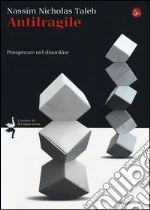 Title :
Antifragile. Prosperare nel disordine
Title :
Antifragile. Prosperare nel disordineAuthor: Taleb Nassim Nicholas Publisher: Il Saggiatore Questo libro offre una nuova visione del mondo. La prospettiva che cambierà le nostre idee sulla società e ispirerà le nostre scelte quotidiane. Ci aiuterà a comprendere come il nostro corpo si protegge dalle malattie e le specie viventi si evolvono, come la libertà d'impresa crea prosperità e il genio si trasforma in innovazione. La chiave di tutto è l'antifragilità. Sappiamo che la nostra incapacità di comprendere a fondo i fenomeni umani e naturali ci espone al rischio degli eventi inaspettati. Ma l'incertezza non è solo una fonte di pericoli da cui difendersi: possiamo trarre vantaggio dalla volatilità e dal disordine, persino dagli errori, ed essere quindi antifragili. Medicina, alimentazione, architettura, tecnologia, informazione, politica, economia, gestione dei risparmi: sono solo alcuni dei campi di applicazione pratica in cui Nassim Nicholas Taleb ci accompagna, con l'ironia e la verve polemica che lo hanno reso celebre. Attingendo da uno sconfinato repertorio di episodi storici, fenomeni biologici e naturali, curiose esperienze personali, unendo la logica alla scettica saggezza degli antichi e allo spirito pratico dell'uomo della strada, Taleb è riuscito nel tentativo di creare una guida eclettica, scanzonata e iconoclasta per orientarsi in un mondo imprevedibile e dominato dal caos, il mondo del Cigno nero. € 24,00
|
|
|
1912 |
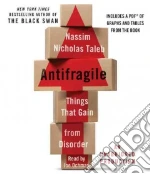 Title :
Antifragile (CD Audiobook)
Title :
Antifragile (CD Audiobook)Author: Taleb Nassim Nicholas, Ochman Joe (NRT) Publisher: Random House Nassim Nicholas Taleb, the bestselling author of The Black Swan and one of the foremost thinkers of our time, reveals how to thrive in an uncertain world. Just as human bones get stronger when subjected to stress and tension, and rumors or riots intensify when someone tries to repress them, many things in life benefit from stress, disorder, volatility, and turmoil. What Taleb has identified and calls “antifragile” is that category of things that not only gain from chaos but need it in order to survive and flourish. In The Black Swan, Taleb showed us that highly improbable and unpredictable events underlie almost everything about our world. In Antifragile, Taleb stands uncertainty on its head, making it desirable, even necessary, and proposes that things be built in an antifragile manner. The antifragile is beyond the resilient or robust. The resilient resists shocks and stays the same; the antifragile gets better and better. Furthermore, the antifragile is immune to prediction errors and protected from adverse events. Why is the city-state better than the nation-state, why is debt bad for you, and why is what we call “efficient” not efficient at all? Why do government responses and social policies protect the strong and hurt the weak? Why should you write your resignation letter before even starting on the job? How did the sinking of the Titanic save lives? The book spans innovation by trial and error, life decisions, politics, urban planning, war, personal finance, economic systems, and medicine. And throughout, in addition to the street wisdom of Fat Tony of Brooklyn, the voices and recipes of ancient wisdom, from Roman, Greek, Semitic, and medieval sources, are loud and clear. Antifragile is a blueprint for living in a Black Swan world. Erudite, witty, and iconoclastic, Taleb’s message is revolutionary: The antifragile, and only the antifragile, will make it. Praise for Antifragile “Taleb takes on everything from the mistakes of modern architecture to the dangers of meddlesome doctors and how overrated formal education is. . . . An ambitious and thought-provoking read . . . highly entertaining.”—The Economist “This is a bold, entertaining, clever book, richly crammed with insights, stories, fine phrases and intriguing asides. . . . I will have to read it again. And again.”—The Wall Street Journal “[Taleb] writes as if he were the illegitimate spawn of David Hume and Rev. Bayes, with some DNA mixed in from Norbert Weiner and Laurence Sterne. . . . Taleb is writing original stuff—not only within the management space but for readers of any literature—and . . . you will learn more about more things from this book and be challenged in more ways than by any other book you have read this year. Trust me on this.”—Harvard Business Review “By far my favorite book among several good ones published in 2012. In addition to being an enjoyable and interesting read, Taleb’s new book advances general understanding of how different systems operate, the great variation in how they respond to unthinkables, and how to make them more adaptable and agile. His systemic insights extend very well to company-specific operational issues—from ensuring that mistakes provide a learning process to the importance of ensuring sufficient transparency to the myriad of specific risk issues.”—Mohamed El-Erian, CEO of PIMCO, Bloomberg From the Hardcover edition. € 37,80
|
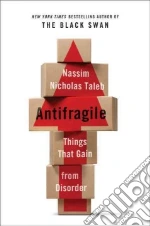 Title :
Antifragile
Title :
AntifragileAuthor: Taleb Nassim Nicholas Publisher: Random House Inc Nassim Nicholas Taleb, the bestselling author of The Black Swan and one of the foremost thinkers of our time, reveals how to thrive in an uncertain world. Just as human bones get stronger when subjected to stress and tension, and rumors or riots intensify when someone tries to repress them, many things in life benefit from stress, disorder, volatility, and turmoil. What Taleb has identified and calls “antifragile” is that category of things that not only gain from chaos but need it in order to survive and flourish. In The Black Swan, Taleb showed us that highly improbable and unpredictable events underlie almost everything about our world. In Antifragile, Taleb stands uncertainty on its head, making it desirable, even necessary, and proposes that things be built in an antifragile manner. The antifragile is beyond the resilient or robust. The resilient resists shocks and stays the same; the antifragile gets better and better. Furthermore, the antifragile is immune to prediction errors and protected from adverse events. Why is the city-state better than the nation-state, why is debt bad for you, and why is what we call “efficient” not efficient at all? Why do government responses and social policies protect the strong and hurt the weak? Why should you write your resignation letter before even starting on the job? How did the sinking of the Titanic save lives? The book spans innovation by trial and error, life decisions, politics, urban planning, war, personal finance, economic systems, and medicine. And throughout, in addition to the street wisdom of Fat Tony of Brooklyn, the voices and recipes of ancient wisdom, from Roman, Greek, Semitic, and medieval sources, are loud and clear. Antifragile is a blueprint for living in a Black Swan world. Erudite, witty, and iconoclastic, Taleb’s message is revolutionary: The antifragile, and only the antifragile, will make it. Praise for Antifragile “Taleb takes on everything from the mistakes of modern architecture to the dangers of meddlesome doctors and how overrated formal education is. . . . An ambitious and thought-provoking read . . . highly entertaining.”—The Economist “This is a bold, entertaining, clever book, richly crammed with insights, stories, fine phrases and intriguing asides. . . . I will have to read it again. And again.”—The Wall Street Journal “[Taleb] writes as if he were the illegitimate spawn of David Hume and Rev. Bayes, with some DNA mixed in from Norbert Weiner and Laurence Sterne. . . . Taleb is writing original stuff—not only within the management space but for readers of any literature—and . . . you will learn more about more things from this book and be challenged in more ways than by any other book you have read this year. Trust me on this.”—Harvard Business Review “By far my favorite book among several good ones published in 2012. In addition to being an enjoyable and interesting read, Taleb’s new book advances general understanding of how different systems operate, the great variation in how they respond to unthinkables, and how to make them more adaptable and agile. His systemic insights extend very well to company-specific operational issues—from ensuring that mistakes provide a learning process to the importance of ensuring sufficient transparency to the myriad of specific risk issues.”—Mohamed El-Erian, CEO of PIMCO, Bloomberg € 26,80
|
|
1911 |
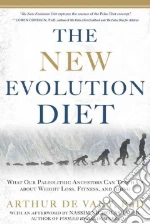 Title :
The New Evolution Diet
Title :
The New Evolution DietAuthor: De Vany Arthur, Taleb Nassim Nicholas (AFT) Publisher: Rodale Pr Believe it or not, our DNA is almost exactly the same as that of our ancestors. While scientific advances in agriculture, medicine, and technology have protected man, to some degree, from dangers such as starvation, illness, and exposure, the fact remains that our cave-dwelling cousins were considerably healthier than we are. Our paleolithic ancestors did not suffer from heart disease, diabetes, high blood pressure, or obesity. In fact, a good deal of what we view as normal aging is a modern condition that is more akin to disease than any natural state of growing older. Our predecessors were incomparably better nourished than we are, and were incredibly physically fit. And certainly none of them ever craved a doughnut, let alone tasted one. In fact, the human preference for sweet tastes and fatty textures was developed in an environment where such treats were rare, and signaled dense, useful energy. This once-helpful adaptation is the downfall of many a dieter today. It's what makes it hard to resist fats and sweets, especially when they are all around us. We are not living as we were built to live. Our genes were forged in an environment where activity was mandatory—you were active or you starved or were eaten. This created strong selective pressure for genes encoding a smart, physically adept individual capable of very high activity levels. Humans are among the most active of species, and we carry energetically expensive brains to boot. Our energy expenditures rank high among all animals. At least they once did. The New Evolution Diet is a roadmap back to the better health our ancestors once enjoyed. By eliminating modern foods, including carbohydrates, dairy, and all processed foods from our diets, we can undo much of the damage caused by our modern food environment. The plan is based on three simple principles: 1. Enjoy the pleasure of food and do not count or restrict calories. Eat three satisfying meals a day filled with non-starchy vegetables, fruits, and high-quality, lean proteins 2. Do not starve yourself, but do go hungry episodically, for brief periods, to promote a low fasting blood insulin level and increase metabolic fat-burning. 3. Exercise less, not more, but with more playfulness and intensity. The goal is to create a strong body with a high resting metabolism and a large physiologic capacity to move through life easily—not to burn calories. € 14,80
|
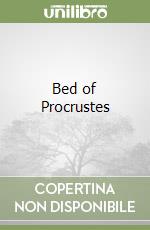 Title :
Bed of Procrustes
Title :
Bed of ProcrustesAuthor: Nassim Nicholas Taleb Publisher: PENGUIN GROUP € 9,10
|
|
2011 |
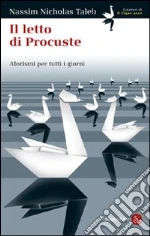 Title :
Il letto di Procuste. Aforismi per tutti i giorni
Title :
Il letto di Procuste. Aforismi per tutti i giorniAuthor: Taleb Nassim Nicholas Publisher: Il Saggiatore Con "II Cigno nero" ha previsto l'imprevedibile, anticipando la crisi e diventando il nuovo guru di Wall Street. Il pensatore più originale degli ultimi anni torna ora per stilare una lunga lista di antidoti ai piccoli problemi quotidiani. Con ironia e sarcasmo, "Il letto di Procuste" svela ai lettori gli autoinganni con cui ogni giorno convivono: inventiamo malattie per vendere medicine, ci illudiamo che un posto di lavoro non sia una forma di schiavitù, sprechiamo tempo lamentandoci di non averne. Irriverenti, disarmanti e spassosi, gli aforismi di Taleb si schierano contro le categorie definite, le idee intercambiabili e le soluzioni preconfezionate. € 12,00
Scontato: € 11,40
|
|
|
1910 |
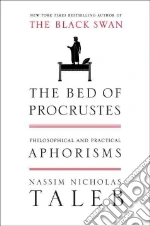 Title :
The Bed of Procrustes
Title :
The Bed of ProcrustesAuthor: Taleb Nassim Nicholas Publisher: Random House Inc By the author of the modern classic The Black Swan, this collection of aphorisms and meditations expresses his major ideas in ways you least expect. The Bed of Procrustes takes its title from Greek mythology: the story of a man who made his visitors fit his bed to perfection by either stretching them or cutting their limbs. It represents Taleb’s view of modern civilization’s hubristic side effects—modifying humans to satisfy technology, blaming reality for not fitting economic models, inventing diseases to sell drugs, defining intelligence as what can be tested in a classroom, and convincing people that employment is not slavery. Playful and irreverent, these aphorisms will surprise you by exposing self-delusions you have been living with but never recognized. With a rare combination of pointed wit and potent wisdom, Taleb plows through human illusions, contrasting the classical values of courage, elegance, and erudition against the modern diseases of nerdiness, philistinism, and phoniness. € 18,50
|
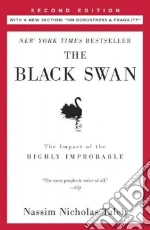 Title :
The Black Swan
Title :
The Black SwanAuthor: Taleb Nassim Nicholas Publisher: Random House Inc A black swan is a highly improbable event with three principal characteristics: It is unpredictable; it carries a massive impact; and, after the fact, we concoct an explanation that makes it appear less random, and more predictable, than it was. The astonishing success of Google was a black swan; so was 9/11. For Nassim Nicholas Taleb, black swans underlie almost everything about our world, from the rise of religions to events in our own personal lives. Why do we not acknowledge the phenomenon of black swans until after they occur? Part of the answer, according to Taleb, is that humans are hardwired to learn specifics when they should be focused on generalities. We concentrate on things we already know and time and time again fail to take into consideration what we don’t know. We are, therefore, unable to truly estimate opportunities, too vulnerable to the impulse to simplify, narrate, and categorize, and not open enough to rewarding those who can imagine the “impossible.” For years, Taleb has studied how we fool ourselves into thinking we know more than we actually do. We restrict our thinking to the irrelevant and inconsequential, while large events continue to surprise us and shape our world. Now, in this revelatory book, Taleb explains everything we know about what we don’t know. He offers surprisingly simple tricks for dealing with black swans and benefiting from them. Elegant, startling, and universal in its applications The Black Swan will change the way you look at the world. Taleb is a vastly entertaining writer, with wit, irreverence, and unusual stories to tell. He has a polymathic command of subjects ranging from cognitive science to business to probability theory. The Black Swan is a landmark book–itself a black swan. From the Hardcover edition. € 19,50
|
|
2008 |
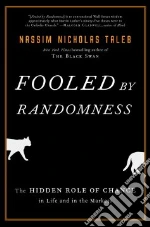 Title :
Fooled by Randomness
Title :
Fooled by RandomnessAuthor: Taleb Nassim Nicholas Publisher: Random House Inc Now in a striking new hardcover edition, Fooled by Randomness is the word-of-mouth sensation that will change the way you think about business and the world. Nassim Nicholas Taleb–veteran trader, renowned risk expert, polymathic scholar, erudite raconteur, and New York Times bestselling author of The Black Swan–has written a modern classic that turns on its head what we believe about luck and skill. This book is about luck–or more precisely, about how we perceive and deal with luck in life and business. Set against the backdrop of the most conspicuous forum in which luck is mistaken for skill–the world of trading–Fooled by Randomness provides captivating insight into one of the least understood factors in all our lives. Writing in an entertaining narrative style, the author tackles major intellectual issues related to the underestimation of the influence of happenstance on our lives. The book is populated with an array of characters, some of whom have grasped, in their own way, the significance of chance: the baseball legend Yogi Berra; the philosopher of knowledge Karl Popper; the ancient world's wisest man, Solon; the modern financier George Soros; and the Greek voyager Odysseus. We also meet the fictional Nero, who seems to understand the role of randomness in his professional life but falls victim to his own superstitious foolishness. However, the most recognizable character of all remains unnamed–the lucky fool who happens to be in the right place at the right time–he embodies the “survival of the least fit.” Such individuals attract devoted followers who believe in their guru's insights and methods. But no one can replicate what is obtained by chance. Are we capable of distinguishing the fortunate charlatan from the genuine visionary? Must we always try to uncover nonexistent messages in random events? It may be impossible to guard ourselves against the vagaries of the goddess Fortuna, but after reading Fooled by Randomness we can be a little better prepared. PRAISE FOR FOOLED BY RANDOMNESS: Named by Fortune One of the Smartest Books of All Time A Financial Times Best Business Book of the Year “[Fooled by Randomness] is to conventional Wall Street wisdom approximately what Martin Luther's ninety-five theses were to the Catholic Church.” –Malcolm Gladwell, author of Blink “The book that rolled down Wall Street like a hand grenade.” –Maggie Mahar, author of Bull! A History of the Boom, 1982—1999 “Fascinating . . . Taleb will grab you.” –Peter L. Bernstein, author of Capital Ideas Evolving “Recalls the best of scientist/essayists like Richard Dawkins . . . and Stephen Jay Gould.” –Michael Schrage, author of Serious Play: How the World's Best Companies Simulate to Innovate “We need a book like this. . . . Fun to read, refreshingly independent-minded.” –Robert J. Shiller, author of Irrational Exuberance “Powerful . . . loaded with crackling little insights [and] extreme brilliance.” –National Review “If asked to name the five best books written about markets, Fooled by Randomness would be on my list.” –Jack D. Schwager, author of Market Wizards: Interviews with Top Traders “Excellent and thought-provoking . . . an entertaining book.” –Financial Times € 26,80
|
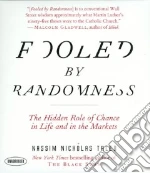 Title :
Fooled by Randomness (CD Audiobook)
Title :
Fooled by Randomness (CD Audiobook)Author: Taleb Nassim Nicholas, Pratt Sean (NRT) Publisher: Gildan Audio The author of € 34,00
|
|
2007 |
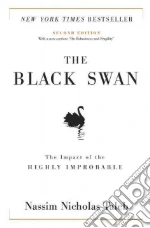 Title :
The Black Swan
Title :
The Black SwanAuthor: Taleb Nassim Nicholas Publisher: Random House Inc A black swan is a highly improbable event with three principal characteristics: It is unpredictable; it carries a massive impact; and, after the fact, we concoct an explanation that makes it appear less random, and more predictable, than it was. The astonishing success of Google was a black swan; so was 9/11. For Nassim Nicholas Taleb, black swans underlie almost everything about our world, from the rise of religions to events in our own personal lives. Why do we not acknowledge the phenomenon of black swans until after they occur? Part of the answer, according to Taleb, is that humans are hardwired to learn specifics when they should be focused on generalities. We concentrate on things we already know and time and time again fail to take into consideration what we don’t know. We are, therefore, unable to truly estimate opportunities, too vulnerable to the impulse to simplify, narrate, and categorize, and not open enough to rewarding those who can imagine the “impossible.” For years, Taleb has studied how we fool ourselves into thinking we know more than we actually do. We restrict our thinking to the irrelevant and inconsequential, while large events continue to surprise us and shape our world. Now, in this revelatory book, Taleb explains everything we know about what we don’t know. He offers surprisingly simple tricks for dealing with black swans and benefiting from them. Elegant, startling, and universal in its applications The Black Swan will change the way you look at the world. Taleb is a vastly entertaining writer, with wit, irreverence, and unusual stories to tell. He has a polymathic command of subjects ranging from cognitive science to business to probability theory. The Black Swan is a landmark book–itself a black swan. € 31,20
|
|

|

|

|